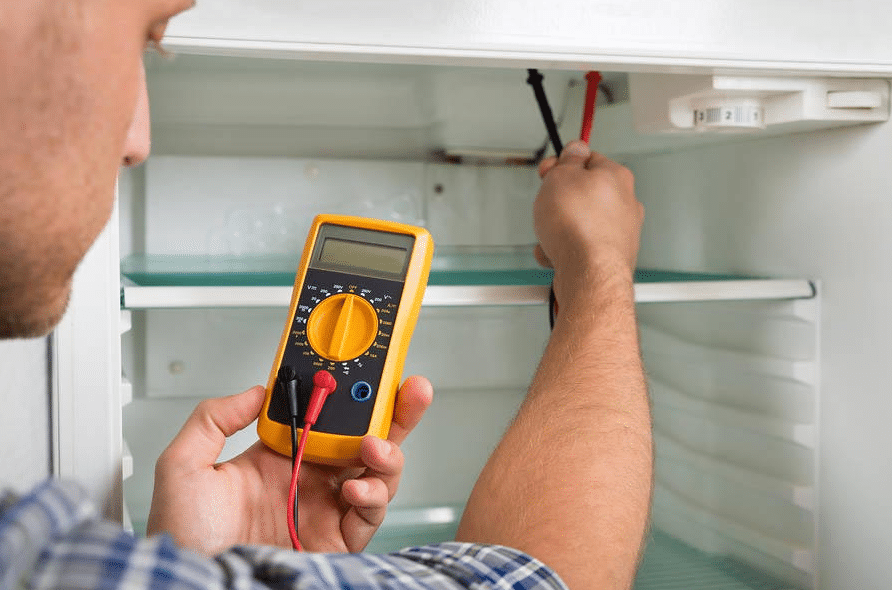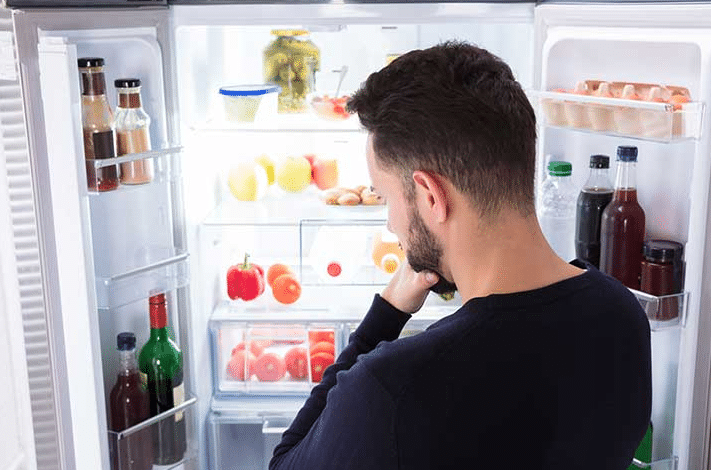Refrigerator Not Cooling? Best Solutions
Refrigerator Not Cooling: Is your refrigerator not cooling or preserving your food? Our team at Mr. Appliance can help you diagnose your potential problem, walk you through the repair steps, and explain when you should step back and let a professional handle it.
Here are some refrigerator troubleshooting tips to help you zero in on the problem if you notice your fridge not cooling. If you can hear the compressor running but the fridge isn’t cooling, the problem is most likely either frost-clogged evaporator coils or a stuck or broken evaporator fan. Evaporator fans often squeal or chirp when they start to go bad. You’ll know it’s the evaporator fan if the noise gets louder when you open the freezer door. The evaporator coils and fan are located behind a cover in the freezer compartment.

Sometimes there is nothing broken about your fridge, despite the fact that it isn’t cool. These “easy fixes” are steps you can take to save yourself from an embarrassing conversation with a repair technician and from any unnecessary services fees.
- The refrigerator isn’t plugged in.
- The thermostat has been turned down
- The door isn’t closing properly.
- The cold air can’t circulate.
Samsung Refrigerator Not Cooling
- As debris builds up on the coils, the refrigerator becomes less efficient, causing the refrigerator to work harder to cool down. If the coils are significantly dirty, the refrigerator will not be able to maintain the proper temperature. Check the condenser coils to determine if they are dirty—if the condenser coils are dirty, clean them.
- To determine if the fan motor is defective, first check the fan blade for obstructions. Next, try turning the fan motor blade by hand. If the blade does not spin freely, replace the condenser fan motor. If no obstructions are present and the fan blade spins freely, use a multimeter to test the fan motor for continuity. If the condenser fan motor does not have continuity, replace it.
- If this occurs, the freezer may still get cold, while the refrigerator will not get cold. To determine if the evaporator fan motor is defective, try turning the fan blade by hand. If the fan blade does not turn freely, replace the fan motor. Additionally, if the motor is unusually noisy, replace it. Finally, if the motor does not run at all, use a multimeter to test the motor windings for continuity. If the windings do not have continuity, replace the evaporator fan motor.
LG Refrigerator Not Cooling
The dispenser control board governs most of the functions of the dispenser system. If the control board is faulty, it may stop supplying power to the entire dispenser system. If only one dispenser part is not working, test each of the dispenser components before testing the control board. It is more likely that a single part has failed. If the entire dispenser system is not working, the control board is more likely to be at fault.
The dispenser switches send voltage to the dispenser. If one of the dispenser switches is defective, the dispenser will not work. To determine if a dispenser switch is defective, use a multimeter to test each switch for continuity. If a dispenser switch does not have continuity, replace it.
Whirlpool Refrigerator Not Cooling
Dirty condenser coils are the most common cause for a Whirlpool refrigerator not cooling. Condenser coils dissipate heat as the refrigerant passes through them. If the coils are clogged in dirt and debris, they can’t release the heat properly.
The second most common cause for a Whirlpool refrigerator not cool is a defective door seal. If the door seal is loose or damaged, your fridge won’t cool properly. The door seal ensures the cold air inside the refrigerator is locked inside rather than leaking into your kitchen. Check the door seal for damage, gaps, or other defects. If you don’t have a tight door seal, replace it.

GE Refrigerator Not Cooling
One of the ways a refrigerator can lose its cool is by allowing the cool air to leak out around the doors. Refrigerator doors are sealed with a rubber gasket that traps the cool air inside. If the gasket is dirty or damaged, the air can seep out and cause the internal temperature to be too high.
While the temperature may only fluctuate slightly as a result, a light inside the refrigerator can cause inefficient cooling. A switch located on the outer facing of the door turns the light off when the door closes, but if the switch is malfunctioning, the light will stay on permanently.
Frigidaire Refrigerator Not Cooling
Although some refrigerators are quiet when they operate, if you can’t hear it running or feel the compressor, then that means your fridge isn’t working properly. First, you need to turn the cold control completely off or try unplugging the fridge. Wait a couple of minutes before you turn on the compressor so your refrigerator can run a diagnostic.
If your fridge is experiencing water buildup where your food is or ice buildup in the freezer, most likely you’re dealing with a frost problem or clogged defrost drain. In your fridge directly below the evaporator, there’s a water collection pan. Beneath the water collection pan is a drain hole. Leading from the drain hole is a drain pan that has a drain tube connected to it. If your ice maker isn’t producing ice, check the water supply line to make sure it’s properly connected to the valve.
How Long Does It Take For A Refrigerator To Cool Down?
When is starting up from room temp ( 70 degrees F inside the refrigerator ) a frost free refrigerator will normally need 4 – 6 hours running before it will get close to the correct temp.
Why My Ge Refrigerator Is Not Cooling?
One of the most common causes of a GE refrigerator not cooling properly is a problem with the self-defrosting functions, according to the Appliance Repair It website. The parts likely to cause the problem are the defrost thermostat, defrost heater or the thermistor located above the coils.
What Would Cause A Refrigerator To Stop Getting Cold?
The most common cause for this condition is a problem with the defrost system. If the refrigerator freezer is cold but the refrigerator is warm, the evaporator fan motor might have failed. Every refrigerator has a set of coils called an evaporator. The evaporator may be frosted up caused by a defrost problem.




